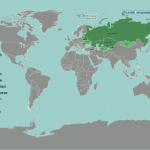The Language Struggle in Russia
The colorful domes of Saint Basil’s Cathedral in Moscow brilliantly juxtapose the exquisite gardens and palaces of the Kremlin. Four hundred miles away, in Saint Petersburg, the Hermitage museum displays 18th century architectural pomp, attesting to the cultural splendor contained inside. Travelling from one city to the other is a puddle jump, considering the vast expanses of territory that extend in all directions to form the country of Russia. Expectedly, ethnic groups in the townships furthest from the capital, from train stations battered by Siberian winds to desolate towns on the Eurasian Steppe, feel less attachment to Russian culture and language. Former Soviet Republics, in the South and the West are returning to their former languages, painful as it may be, and seeking partnership with Europe or China, at least for a breath of fresh air. The cultural torch has been attenuated in recent years and the Russian government’s response, seeking to maintain the dominance of Russian as a language, threatens many of the minority languages that have no chance of recognition by foreign powers.
There are just over one hundred of these minority languages yet a majority face imminent extinction. The largest groups belong to the Turkic and Finno-Ugric language families who have found refuge in the mountains and snowy western taiga respectively. Siberian languages have also had enough isolation to resist emissaries of “culture” from Moscow. Ethnic cleansing, Russification, budget cuts have all been enacted to conform ethnic groups towards traditional Cyrillic and Latin scripts, free of loans words from Persian or Arabic. Advocates of pure Russian even argue about individual letters, notably politician Vladimir Zhirinovsky who states “ы” is an Asiatic vowel and should be banned. Another extreme measure, performed under Stalin, was deportation. In fact, Ubykh once existing in the Caucuses, is now believed to be clinging for life in Turkey! Despite the Constitution’s provisions for the right to speak all languages from Dargva in the South to Chukchi in the north, Russia will look for standardization at a time when former Soviet Republics are celebrating and legitimizing their native languages. Latvia, is just one example, going so far as to ban bilingual education which will coerce the Russian community to adopt the Baltic language. Central Asia, home of the contested vowel mentioned above, is distancing itself economically, and thus linguistically. The Shanghai Cooperation Organization opens Central Asian countries, and their significant oil reserves, to trade with China, meaning energy independence from Russia. Meanwhile, universities are teaching business in alternative languages such as English and East Asian varieties to such an effect that by 2025, 150 million Russian speakers will remain worldwide (down from 300 million in 1990!). When Kazakhstan moved its capital to Astana in 1997 from Almaty, formally called Verniy, it was a testament to the change in politics and cultural influence. “Verniy” means “loyal” in Russian.
Constantly in the news over their loyalty to Russia is Ukraine. The Ukrainian language has long been regarded by Russians as either a dialect of Russian, “Little Russian” or nonexistent altogether, excepted during the cultural and literary revival of Ukraine during the Romantic era. However the situation is changing and the Russian self-proclaimed mother tongue may be losing the loyalty of its offspring. Putin’s foreign policy threats over natural gas exports and repaying Ukrainian debt may have thwarted the Euromaidan rebellion but not the government in Kiev from rejecting official status for the Russian language in some regions of Ukraine. This may be a major reason for the Crimean annexation by Russia with the larger objective of creating a federal economic region based in Russia to combat the European Union and China while fostering the Russian language. However, these measures may be to the expense of the Tatar language in Crimea and other varieties living precariously in a zone of increasing tension near Russia’s ever-changing frontiers. The good news is the will to defy Soviet linguistic dogmas.
For an overview of our translation expertise, visit our interpretation service page.
Category: Foreign Language









